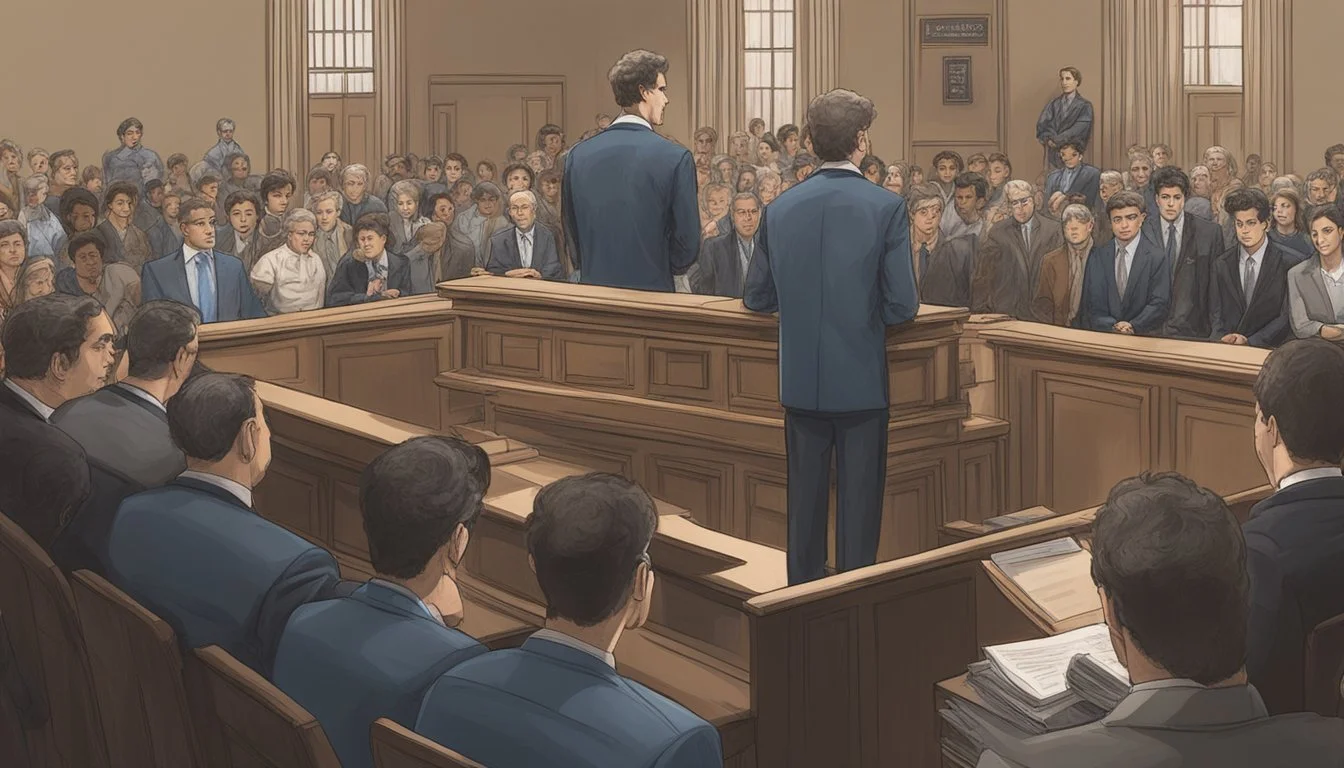Fact-Checking the Menendez Brothers
Separating Reality from Hollywood Portrayals in True Crime Media
The Menendez brothers' case continues to captivate public interest decades after their conviction for murdering their parents. Recent dramatizations, like Netflix's "Monsters: The Lyle and Erik Menendez Story," have reignited discussions about the case's details and the brothers' motivations.
Separating fact from fiction in these dramatizations can be challenging, as the truth often lies in a gray area between conflicting accounts. The Netflix series has faced criticism for its portrayal of the brothers' relationship and the alleged abuse they suffered. Erik Menendez himself has denounced the show, calling it full of "blatant lies" and "vile character portrayals."
While some aspects of the Menendez case remain disputed, certain facts are well-established. Lyle and Erik Menendez were convicted of first-degree murder in 1996 and sentenced to life in prison without parole. The brothers claimed they killed their parents in self-defense after years of sexual and emotional abuse, but prosecutors argued the murders were motivated by greed.
Overview of the Menendez Brothers Case
Lyle and Erik Menendez gained notoriety for the brutal murder of their parents in 1989. On August 20, the brothers shot and killed Jose and Kitty Menendez in their Beverly Hills mansion.
The case shocked the nation due to its violent nature and the privileged background of the accused. Lyle, 21, and Erik, 18, initially claimed they were not involved in the killings.
During the investigation, suspicions grew as the brothers engaged in lavish spending sprees following their parents' deaths. This behavior raised questions about their potential motives.
In 1990, Erik confessed to his psychologist, leading to the brothers' arrest. The ensuing legal proceedings captivated public attention and sparked intense media coverage.
The Menendez trial began in 1993, featuring dramatic testimonies and allegations of abuse. The brothers claimed they acted in self-defense after years of physical, emotional, and sexual abuse by their father.
After a mistrial in 1994, a second trial in 1996 resulted in both brothers being convicted of first-degree murder. They received life sentences without the possibility of parole.
The case continues to generate interest and debate. In 2023, attorneys for the Menendez brothers sought to reopen the case based on new evidence, highlighting the enduring nature of this complex legal saga.
Biographical Background
Lyle and Erik Menendez's early lives and family dynamics played a crucial role in the events that unfolded. Their upbringing in an affluent household and complex relationships with their parents shaped their experiences and perspectives.
Early Life of Lyle and Erik Menendez
Lyle Menendez was born on January 10, 1968, and Erik Menendez followed on November 27, 1970. The brothers grew up in Princeton, New Jersey, in a wealthy and seemingly successful family. Their father, José Menendez, was a Cuban immigrant who became a successful entertainment executive.
Their mother, Kitty Menendez, was a homemaker and former schoolteacher. The family later moved to California, where José's career in the entertainment industry flourished. Lyle and Erik attended prestigious schools and enjoyed many privileges associated with their affluent lifestyle.
Despite their outward success, the brothers reportedly faced intense pressure from their father to excel academically and in sports.
The Family Dynamics
The Menendez family presented a facade of success and happiness to the outside world. However, behind closed doors, the reality was quite different. José Menendez was described as a demanding and controlling father who pushed his sons relentlessly.
Kitty Menendez struggled with depression and substance abuse issues. The brothers later claimed they experienced emotional and physical abuse from their father. Their mother was reportedly aware of the abuse but did not intervene.
The family's internal tensions and dysfunctional relationships created a volatile environment. This complex family dynamic would later become a central focus during the brothers' trial and in subsequent documentaries about the case.
The Murders and Subsequent Arrest
On August 20, 1989, Lyle and Erik Menendez fatally shot their parents, Jose and Kitty Menendez, in their Beverly Hills mansion. The brutal double murder shocked the affluent community and set off a complex investigation that would captivate the nation for years to come.
Investigation Timeline
The initial 911 call came from Lyle Menendez at 11:47 PM, reporting that someone had killed his parents. Police arrived to find Jose and Kitty Menendez dead from multiple gunshot wounds. In the following weeks, detectives interviewed family members and associates.
The brothers' lavish spending in the months after the murders raised suspicions. They purchased expensive cars, watches, and even a restaurant. This behavior contrasted sharply with their supposed grief.
A breakthrough came when Erik confessed to his psychologist, Dr. Jerome Oziel. The doctor's girlfriend later informed police about the confession.
Arrest and Media Attention
On March 8, 1990, nearly seven months after the murders, police arrested Lyle Menendez in Beverly Hills. Erik, who was in Israel at the time, surrendered to police upon his return to Los Angeles three days later.
The case immediately attracted intense media coverage. The brothers' wealthy background, the brutality of the crime, and their youthful appearance fueled public interest.
Tabloids and news programs extensively covered the arrests and subsequent legal proceedings. The Menendez brothers became household names, their story a subject of national fascination and debate.
Legal Proceedings
The Menendez brothers' case involved complex legal proceedings spanning multiple trials. Key aspects included the prosecution's arguments of premeditated murder and the defense's claims of abuse-driven actions.
Summary of the Trials
The first trial began in 1993 and ended in hung juries for both brothers. Separate juries heard the cases against Lyle and Erik Menendez but were unable to reach verdicts.
A second trial commenced in 1995, this time with a single jury for both brothers. The judge made crucial rulings limiting testimony about alleged abuse.
The trial lasted six months and included over 100 witnesses. In March 1996, the jury found Lyle and Erik Menendez guilty of first-degree murder and conspiracy to commit murder.
Key Testimonies and Evidence
Prosecutors presented evidence of the brothers' lavish spending after their parents' deaths. They argued this showed premeditation and greed as motives.
The defense called psychologists who testified about the long-term effects of abuse. However, the judge restricted much of this testimony in the second trial.
Physical evidence included:
Shotgun shells matching the murder weapon
Bloody clothing found in the family's car
Key witness testimonies:
Friends describing the brothers' behavior after the murders
Family members discussing the Menendez household dynamics
The prosecution emphasized inconsistencies in the brothers' accounts and their actions following the killings.
Allegations of Abuse
The Menendez brothers' defense centered on claims of severe abuse by their parents. These allegations became a crucial part of their legal strategy and sparked intense debate about their credibility and impact.
Claims Made by the Defense
Lyle and Erik Menendez accused their father, José, of sexual abuse. They alleged this abuse occurred throughout their childhood and adolescence. The brothers' defense team argued that the murders were a response to years of physical, emotional, and sexual trauma.
Erik Menendez reportedly wrote a letter to his cousin Andy Cano mentioning the abuse months before the killings. This piece of evidence emerged years after the initial trials. Some family members have supported the brothers' claims, while others remain skeptical.
The defense also presented testimony from relatives. Diane Vander Molen, the brothers' cousin, stated Erik had confided in her about the abuse when he was 13.
Psychological Impact and Expert Opinions
Mental health professionals testified about the psychological effects of long-term abuse on the brothers. Experts discussed concepts like dissociation and post-traumatic stress disorder in relation to the case.
The brothers' therapist, Dr. Jerome Oziel, played a significant role. Recordings of sessions with Oziel included admissions of guilt, complicating the abuse narrative.
Some experts argued that the alleged abuse could explain the brothers' actions, while others questioned the validity of recovered memories and the timing of the allegations.
The debate over the psychological impact of the purported abuse continues to influence discussions about the case and potential legal reconsideration.
Media Portrayal and Public Perception
The Menendez brothers case sparked intense media coverage and shaped public opinion. Two key factors influenced how the story was presented and perceived: Dominick Dunne's influential reporting and the sensationalized approach taken by news outlets and entertainment media.
Dominick Dunne's Coverage
Dominick Dunne, a renowned true crime writer, played a significant role in shaping public perception of the Menendez case. His Vanity Fair articles and courtroom coverage reached a wide audience.
Dunne's vivid storytelling and insider access provided readers with gripping details about the trial and the brothers' lives. His work often emphasized the family's wealth and the sensational aspects of the case.
While praised for his engaging writing, critics argued that Dunne's personal opinions and focus on salacious details may have influenced public opinion unfairly.
Sensationalism in News and Entertainment
Media outlets frequently highlighted the most dramatic elements of the Menendez case, often at the expense of nuanced reporting.
Television news programs and tabloids focused heavily on the family's Beverly Hills lifestyle, the brutal nature of the crime, and the brothers' emotional courtroom appearances.
This sensationalized coverage led to widespread public fascination but also created misconceptions about the case's complexities.
Entertainment media further amplified the story through TV movies, books, and documentaries. These dramatizations sometimes blurred the line between fact and fiction, potentially skewing public understanding of the events.
Adaptations and Documentary Analysis
The Menendez brothers' case has inspired numerous adaptations and documentaries, each offering different perspectives on the events. These productions vary in their approach to portraying the brothers and the circumstances surrounding the murders.
Ryan Murphy's Interpretation
Ryan Murphy's "Monsters: The Lyle and Erik Menendez Story" presents a dramatized account of the case. The series delves into the brothers' troubled family life and the events leading up to the murders.
Murphy's adaptation emphasizes the alleged abuse suffered by Lyle and Erik. It portrays their parents, Jose and Kitty Menendez, as complex and flawed individuals.
The series recreates key moments from the brothers' lives and the subsequent trials. It features intense performances that aim to capture the emotional turmoil of the protagonists.
Accuracy vs. Dramatization
Crime documentaries and adaptations often struggle to balance factual accuracy with engaging storytelling. In the case of the Menendez brothers, this challenge is particularly evident.
Documentaries like "The Menendez Brothers: The Truth Uncovered" strive for a more objective approach. They incorporate archival footage, interviews with those involved, and expert analysis.
Dramatized versions, while based on real events, may take creative liberties. These adaptations often fill in gaps in the known narrative or emphasize certain aspects for dramatic effect.
Viewers should approach these productions critically, recognizing that even documentaries can have biases. Comparing multiple sources can provide a more comprehensive understanding of the case.
Cultural Impact and Legacy
The Menendez brothers' case left an indelible mark on American popular culture. Their trial captivated audiences nationwide, becoming one of the most widely watched legal proceedings of its time.
Media coverage of the case was extensive. Numerous books, documentaries, and television specials explored the brothers' story, often with varying degrees of accuracy and sensationalism.
The case sparked debates about family dynamics, abuse, and the justice system. It raised questions about the role of wealth and privilege in high-profile criminal cases.
Pop culture references to the Menendez brothers became commonplace. Late-night comedians frequently joked about the case, particularly focusing on Lyle Menendez's toupee.
The brothers' story continues to fascinate audiences decades later. Recent documentaries and series have re-examined the case, prompting renewed public interest and discussion.
Social media has played a role in reshaping perceptions of the case. Younger generations have engaged with the story, often viewing it through a different lens than audiences did in the 1990s.
The Menendez brothers' legacy extends beyond their crimes. Their case has become a touchstone for discussions about family trauma, media influence, and the complexities of the criminal justice system.






